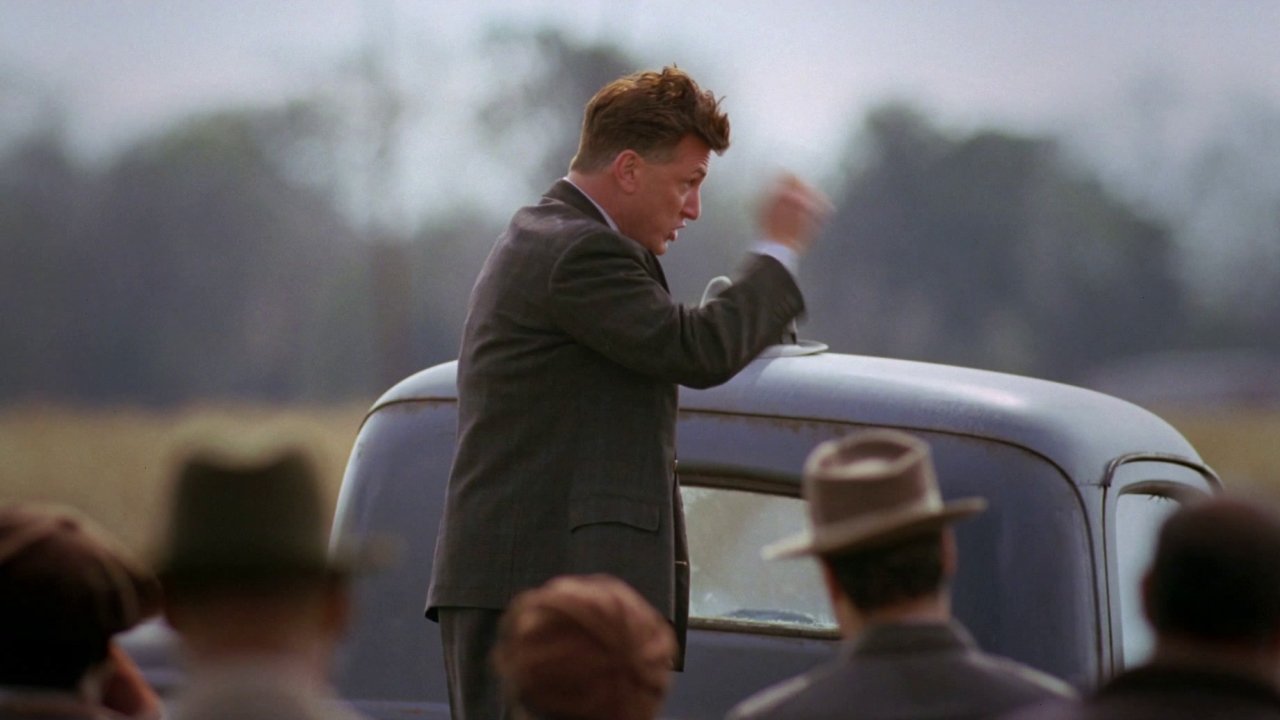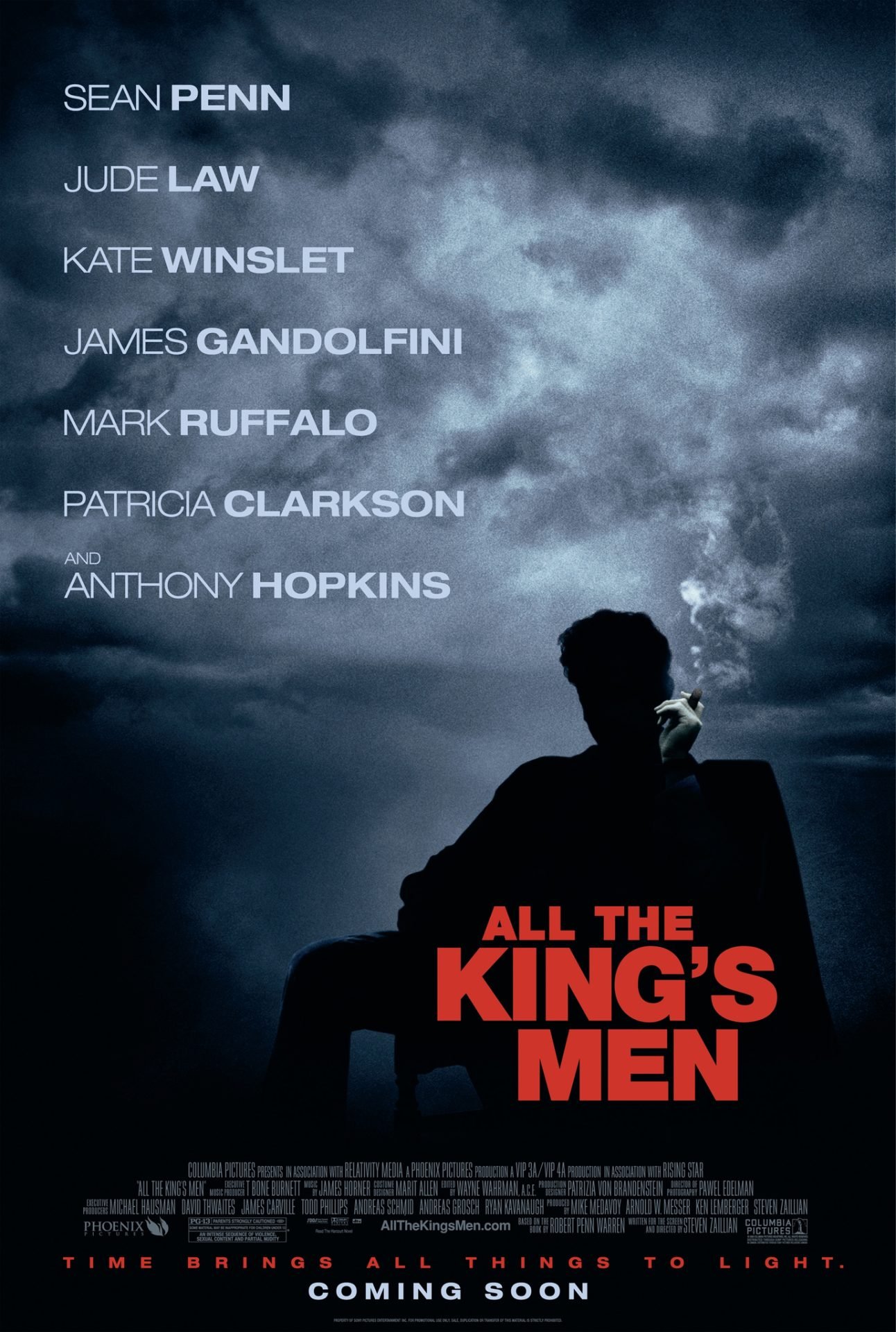You’ve seen the ads and the trailers and according to all sources, this latest filmed version of the Robert Warren Penn novel was to be the greatest thing since sliced bread, or Brokeback Mountain. The cast, the script, the pedigree, and a berth at the Toronto International Film Festival all seemed to indicate that this was going to be the thing to beat during the forthcoming awards’ season. Maybe with all that riding on the movie’s back, it was doomed to fail or, at the very least, disappoint.
All The King’s Men is based loosely on the life of Huey Long, a populist politician in the 30s who served as Louisiana’s governor before going on to be elected as senator. When he was assassinated in 1935 in the Capital Building in Baton Rouge, he was even planning a presidential bid for the Democratic nomination against Franklin Roosevelt.
Penn’s fictional politician is Willie Stark (Sean Penn), a small town public official who catches the attention of political movers and shakers after a small town disaster, that Stark predicted, occurs. Jack Burden (Jude Law), a reporter assigned to cover Stark, immediately recognizes that the same political big wigs backing Stark’s gubernatorial run are actually hoping Stark will split the vote in favour of a more reasonable (read: corruptible) candidate. Stark soon casts off the kid gloves of his handler Duffy (James Gandolfini) and begins appealing to the masses through the sheer force of rhetoric.
While Stark starts out with the best of intentions, he quickly becomes corrupted by his power, believing himself touched by God and given power by Him through the people. He begins to think himself untouchable–even under the threat of impeachment proceedings. Stark employs Jack to find dirt on his chief political rival: a judge named Irwin (Anthony Hopkins) who also happens to be Jack’s godfather. Further, two of Jack’s childhood friends Anne and Adam Stanton (Kate Winslet and Mark Ruffalo) find themselves pulled into Stark’s orbit, while the Stark revolution teeters on the brink of collapse from being attacked on all sides by political opponents and the man’s own personality conflicts.
The thing what really clicks in this movie is the incredibly strong central performance by Sean Penn as Stark. He gives an absolute gravitational force of a performance that draws in everybody else around him. The camera pulls in tight as Penn’s Stark launches into some polemic about how the rich owe a debt to the have-nots, giving these fiery speeches an added degree of intensity. Penn also puts on an accent as thick as the bayou itself; close your eyes and you almost think you’re hearing the twangy tones of political pundit, and executive producer, James Carville: the Ragin’ Cajun.
But while Penn goes full throttle with the New Orleans drawl, he’s stacked against a lot of very talented, but also very British actors, and while Winslet and Law do a passable job, Hopkins just adds some long ‘a’ sounds to his Welsh tones to get by. Matters of accents aside, I just don’t think anyone else in the cast could summon the energy of Penn’s performance. True, Stark is a larger-than-life character demanding larger-than-life delivery, but no one else even seems able to meet Penn half way
But the actors were the best part of the movie, which is a good thing because I’m not entirely sure why this movie was remade in the first place. The first production of All The King’s Men was made in 1949; it won three Academy Awards and was selected by the Library of Congress for preservation in their archives, so it’s not like the film lay forgotten. What was the reason for it to be remade? what new fact of modern life demanded the need for a new adaptation?
Well for one thing, in Penn’s original novel Jack was the main character whereas Robert Rossen’s film put the emphasis on Stark. Writer/Director Steven Zaillian tries to put the emphasis back on Jack, but Penn’s Stark has a very long shadow, and when the film focuses on the Jack Burden character without Stark, it just doesn’t feel the same.And what is the film saying exactly, that politicians can start their career with the best of intentions only to get swallowed by their own hype? I think we already knew that. I guess an allegory could be made to modern Louisiana, comparing Stark’s pie-in-the-sky vision that never truly materializes with the backlog in rebuilding New Orleans, post-Hurricane Katrina, but this movie was made before Katrina; any other allegories to trouble-attracting southern politicians who may have been president recently are just horribly dated.
All The King’s Men can keep a viewer’s interest thanks to some engaging performances, but the rest of the film’s energy is all over the place. Is it a personal story about how proximity to power is corrosive to every one it touches? Or is it a warning to future political leaders waiting in the wings that, no matter your intentions, power still corrupts absolutely? I wish the filmmakers had sorted out these questions beforehand.





